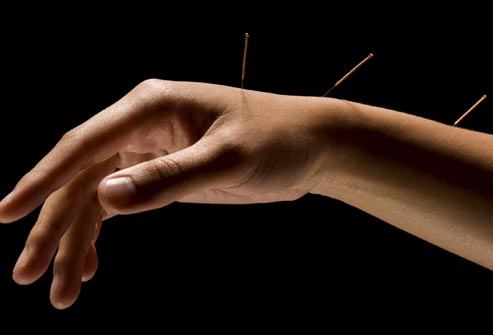Acupuncture for Pain
What is pain?
| |

In medicine pain relates to a sensation that hurts. If you feel pain, you feel discomfort, distress and perhaps agony, depending on the severity of it. Pain is a feeling triggered in the nervous system. It may be sharp or dull, off-and-on or steady, localized (such as back pain) or all over (such as muscle aches from the flu). Sometimes, pain alerts us to injuries and illnesses that need attention. Although pain usually goes away once the underlying problem is addressed, it can last for weeks, months, or even years. Chronic pain may be due to an ongoing condition (such as arthritis) or to abnormal activity in pain-sensing regions of the brain, or the cause may be unknown.Pain is a very individual experience. In fact, a national survey found that more than one-quarter of U.S. adults had recently experienced some sort of pain lasting more than a day.
Acupuncture for Pain
| |
Acupuncture has been used as an effective means of relieving pain and pain management for thousands of years. Acupuncture has been used for a wide range of pain conditions, such as postoperative dental pain, carpal tunnel syndrome, fibromyalgia, headache, neck pain, low back pain, knee pain, menstrual cramps, myofascial pain, osteoarthritis ,cancer pain, and tennis elbow.
In 1997, the National Institutes of Health officially recognized acupuncture as an effective treatment for pain. According to the  1997 NIH Panel, clinical studies showed that acupuncture therapy is helpful in treating many types of chronic pain, including headaches, menstrual cramps, tennis elbow, fibromyalgia, myofascial pain, osteoarthritis, neck pain, low back pain and carpal tunnel syndrome. In addition, the NIH panel concluded that one
1997 NIH Panel, clinical studies showed that acupuncture therapy is helpful in treating many types of chronic pain, including headaches, menstrual cramps, tennis elbow, fibromyalgia, myofascial pain, osteoarthritis, neck pain, low back pain and carpal tunnel syndrome. In addition, the NIH panel concluded that one  of the advantages of acupuncture is that the incidence of adverse effects is substantially lower than that of many drugs or other accepted medical procedures used for the same conditions. As an example, musculoskeletal conditions, such as fibromyalgia, myofascial pain,and tennis elbow, or epicondylitis, are conditions for which acupuncture may be beneficial. These painful conditions are often treated with, among other things, anti-inflammatory medications (aspirin, ibuprofen, etc.) or with steroid injections. Both medical interventions have a potential for deleterious side effects but are still widely used and are considered acceptable treatments. The evidence supporting these therapies is no better than that for acupuncture.
of the advantages of acupuncture is that the incidence of adverse effects is substantially lower than that of many drugs or other accepted medical procedures used for the same conditions. As an example, musculoskeletal conditions, such as fibromyalgia, myofascial pain,and tennis elbow, or epicondylitis, are conditions for which acupuncture may be beneficial. These painful conditions are often treated with, among other things, anti-inflammatory medications (aspirin, ibuprofen, etc.) or with steroid injections. Both medical interventions have a potential for deleterious side effects but are still widely used and are considered acceptable treatments. The evidence supporting these therapies is no better than that for acupuncture.
Another new research conducted through Harvard Medical School and published in the November 2008 issue of Behavioral Brain applied a Position Emission Tomography (PET) scan with Functional Magnetic Resonance Imaging (fMRI) to examine brain signals and pain receptors during an acupuncture analgesia treatment. Research found significant evidence that endogenous opioids are central to the experience of pain and acupuncture analgesia.
Acupuncture vs. Standard Drug Treatments
| |
Acupuncture is a safe and effective treatment option for those who do not want to have side effects with many standard drug treatments (such as anti-inflammatory medication and steroid injections) or for those who do not opt for early surgery. Acupuncture also usually treats the causes of problems and helps relieve the pain.